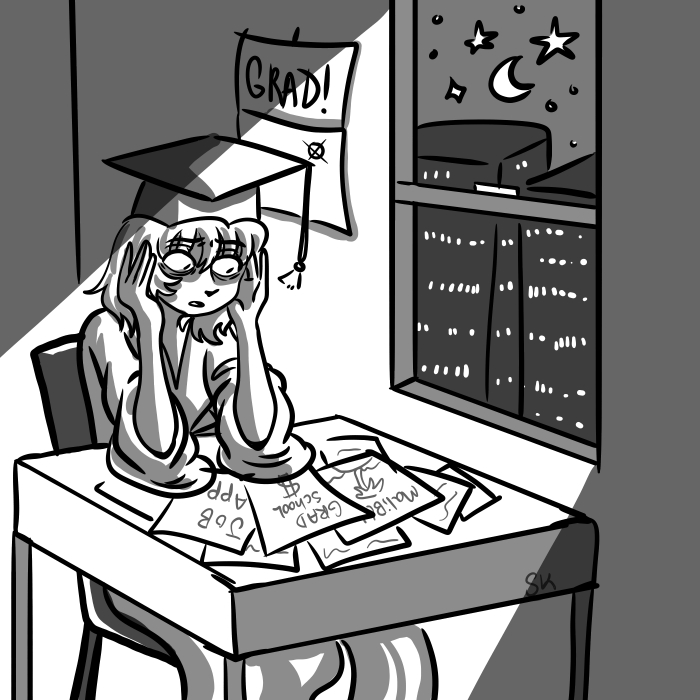After sawing off my arm– applying to MFA programs– I am forced to find the pursuit of graduate school worth it, because if it wasn’t, what was all of that for? I spent over $400 on application fees and a hundred hours pouring over my materials to apply to programs with less than a 5% acceptance rate.
People who claim to be in “the real world” will tell you that you need to be “practical” and pursue something that will “advance society” for “convenience” like “building bridges” or “programming… something” but bachelor of arts degrees are not inherently inapplicable. Not everybody can be, or wants to be, a chemical engineer– we have enough of those fine-tuning our pesticides and food preservatives. You are more likely to be told in your undergraduate that you should pursue higher education when your degree ends with an ‘A’ instead of an ‘S’ because there’s a generalization that liberal arts degrees hold no value outside of academia. As an English and philosophy major, numerous professors stressed that my life would be difficult if I didn’t get a master’s degree.
However, societal pressure should not be an excuse to put off launching your career. It’s important to have a bit of introspection. If you’re asking yourself the question “Should I go to grad school” the answer is going to rely internally, inside your gut along with the dining hall mac and cheese, and not externally, where you feel self-conscious hearing the computer science students next to you talking about their summer internship at Intel. This should not be a passive decision or a process of elimination. For example, “I don’t know what I want to do with my life, so I’ll just do more school” is not going to fly on your personal statement in your applications. If you’re leaning towards “yes” is it because you simply don’t know the next step or because you feel academically unfulfilled in your undergraduate?
A student in the NMU anthropology program said “I keep feeling like I’m waiting for college to begin.” The majority of the intellect they gained was purely from getting older in the four years they were here, and not because they found their undergraduate academically rigorous. This could call for further education, either immediately or in the future, not because of the possibility of a higher salary at the end, but because there are specializations and hyper-specifics you want to know the gritty details of that just aren’t offered in a bachelor’s degree.
If you decide to take a leap of faith and join the workforce, remember that a job is just a job; it is not supposed to be your whole life. The American “toxic productivity” culture forces individuals to identify with their labor, in turn finding their self-worth dependent on it. Your career will mold and adapt based on who you are as a person at the time. You do not need to get a job that exactly pertains to your degree. The beauty of humanities and social science degrees is that they can take you anywhere. You are not confined, the decision you made when you were 18 will not overthrow any possibility of success or overturn the direction of your life. Each field has its own path, and there are multiple ways of maneuvering it.
Before succumbing to societal pressure and deciding to go to graduate school, consider working your way up the corporate ladder and save yourself the grief of taking the Graduate Record Examinations (GRE). Go out to a national park this summer to do some seasonal work and find what you really value amongst all the nature. Be a pencil-pusher-office-drone by day and a tortured artist solving the crimes of realism by night. Most importantly, consider how you want to develop and imagine your life being– ask yourself: “Do I actually want to teach?”







